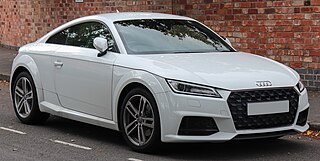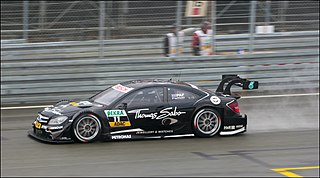
Touring car racing is a motorsport road racing competition that uses race prepared touring cars. It has both similarities to and significant differences from stock car racing, which is popular in the United States.

The Audi TT is a production front-engine, 2-door, 2+2 sports coupé and roadster, manufactured and marketed by Audi from 1998 to 2023 across three generations.

The Audi A5 is a series of compact executive coupé cars produced by the German automobile manufacturer Audi since June 2007. The A5 range additionally comprises the coupe, cabriolet, and "Sportback" version of the Audi A4 saloon and estate models.

The Audi A4 is a line of luxury compact executive cars produced since 1994 by the German car manufacturer Audi, a subsidiary of the Volkswagen Group. The A4 has been built in five generations and is based on the Volkswagen Group B platform. The first generation A4 succeeded the Audi 80. The automaker's internal numbering treats the A4 as a continuation of the Audi 80 lineage, with the initial A4 designated as the B5-series, followed by the B6, B7, B8, and the B9.
The Deutsche Tourenwagen Masters is a sports car racing series sanctioned by ADAC. The series is based in Germany, with rounds elsewhere in Europe. The series currently races a modified version of Group GT3 grand touring cars, replacing the silhouette later Class 1 touring cars of earlier years.
The Deutsche Tourenwagen Meisterschaft (DTM) was a touring car racing series held from 1984 to 1996. Originally based in Germany, it held additional rounds elsewhere in Europe and later worldwide.

The 2004 Deutsche Tourenwagen Masters was the eighteenth season of premier German touring car championship and also fifth season under the moniker of Deutsche Tourenwagen Masters since the series' resumption in 2000. There were 10 championship race weekend with one round each, plus a non-championship round at the streets of Shanghai. Originally each track hosted one race each with the exception of Hockenheimring. Each track hosted one race, with the exception of Hockenheim, which hosted two. As in 2003 each weekend compromised one race of circa one hour and with two compulsory pit stops for each contender.
Class 1 Touring Cars refers to two generations of prototype silhouette-style touring car regulations employed by the FIA.
In the automotive industry, engine downsizing is the practice of utilizing smaller combustion engines over larger ones of the same power capacity when manufacturing vehicles. It is the result of car manufacturers attempting to provide more efficient vehicles that emit fewer emissions, often mandated by legislative standards. The term generally relates to traditional internal combustion engines powered by petrol or diesel.
Turbochargers have been used on various petrol engines since 1962, in order to obtain greater power or torque output for a given engine displacement.

The 2013 Deutsche Tourenwagen Masters was the twenty-seventh season of premier German touring car championship and also fourteenth season under the moniker of Deutsche Tourenwagen Masters since the series' resumption in 2000.

The Audi 5 Series DTM is a touring car constructed by the German car manufacturer Audi AG for use in the Deutsche Tourenwagen Masters. It was developed in 2011 and has been raced in DTM seasons 2012-2018 before being replaced by updated turbo version of Audi RS5 Turbo DTM from 2019 season onwards. It was designed by former Audi Head of Research and Development Wolfgang Dürheimer. The A5 DTM replaced the retired Audi A4 DTM at the end of the 2011 season and based on the production Audi A5.

The Mercedes-AMG C-Coupé DTM is a silhouette racing car designed by Mercedes-Benz for the Deutsche Tourenwagen Masters championship. Mercedes-Benz chose the IAA International Motor Show in Frankfurt to present the new 2012 DTM AMG Mercedes C-Coupé. It is the successor to the AMG-Mercedes C-Klasse race car which was permanently retired after the 2011 season. Since 2015 the car has been renamed Mercedes-AMG C63 DTM. The C-Coupé DTM was initially based on the C204 Mercedes-Benz C-Coupé; for the 2016 season it was updated to reflect the new C205 Mercedes-Benz C-Coupé body style.

The BMW M4 DTM is a touring car constructed by the German car manufacturer BMW for the Deutsche Tourenwagen Masters. It was developed in 2013, and partook in DTM races from 2014 to 2020. Two versions were made: a naturally-aspirated V8 car through 2018, and a turbo Class 1 version starting in 2019. The M4 DTM is based on the production model BMW M4 and replaced the BMW M3 DTM after the 2013 season.

The 2018 Deutsche Tourenwagen Masters was the thirty-second season of premier German touring car championship and also nineteenth season under the moniker of Deutsche Tourenwagen Masters since the series' resumption in 2000. 2018 would be the final season for the traditional 4.0-litre V8 naturally-aspirated engine package that debuted in the inaugural reborn season; as the brand new engine package has been introduced for the following season as part of the "Class One Project" prospect with Japanese Super GT GT500 cars. 2018 also marked the final season for Mercedes-Benz in DTM due to Mercedes-Benz departing to FIA Formula E from the 2019–20 season and thus ended its 19-year participation.

The 2019 DTM was the thirty-third season of premier German touring car championship, first season under "Class 1" regulations era and also twentieth season under the moniker of DTM since the series' resumption in 2000. Mercedes-AMG withdrew from the championship after the 2018 season to focus on their Formula E entry. British sports car manufacturer Aston Martin replaced Mercedes-Benz, which marked the first non-German entry in 23 years when Italian car manufacturer Alfa Romeo last entered the series under the International Touring Car Series name in 1996. Defending champion Gary Paffett did not return to defend his title, as he moved to Formula E.

The 2020 Deutsche Tourenwagen Masters was the thirty-fourth season of premier German touring car championship and also twenty-first season under the moniker of Deutsche Tourenwagen Masters since the series' resumption in 2000 as well as second and final season of "Class 1" regulations era.

The Audi RC8 2.0 TFSI is a prototype four-stroke 2.0-litre single-turbocharged inline-4 gasoline racing engine, developed and produced by Audi Sport GmbH for Deutsche Tourenwagen Masters. The RC8 2.0 TFSI engine is full custom-built but partially borrows the cylinder blocks from Volkswagen-Audi EA888 2.0 R4 16v TSI/TFSI road car engine which had a same displacement. Audi RC8 2.0 TFSI was shakedown on 15 November 2018 and later made public unveil on 20 March 2019 after more engine dyno test. Audi RC8 TFSI is the first-ever turbocharged DTM engine to date, replacing the aging Audi DTM V8 engine after nineteen-years of service which conform the "Class 1" regulations that shared with Japanese Super GT under Nippon Race Engine (NRE) formula.
The BMW P48 Turbo is a prototype four-stroke 2.0-litre single-turbocharged inline-4 racing engine, developed and produced by BMW Motorsport for Deutsche Tourenwagen Masters. The P48 Turbo engine is full custom-built but partially borrows the cylinder blocks from BMW B48 road car engine which had a same displacement. BMW P48 Turbo is the first-ever turbocharged DTM engine to date, replacing the aging BMW P66 Series (P66/1) V8 engine after seven-years of service and conform the "Class 1" regulations that shared with Japanese Super GT under Nippon Race Engine (NRE) formula. BMW P48 Turbo engine currently competes with engine competitors Audi RC8 2.0 TFSI and HWA AFR Turbo 2.0.
The Audi DTM V8 engine family is a series of prototype, four-stroke, 3.6-liter to 4.0-liter, naturally aspirated V-8 racing engines, developed and produced by Audi for the Deutsche Tourenwagen Meisterschaft, between 1990 and 1992; and later the Deutsche Tourenwagen Masters, between 2000 and 2018.












